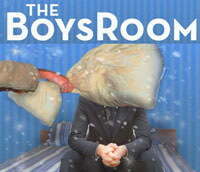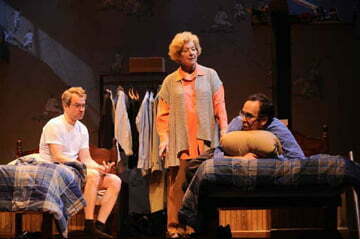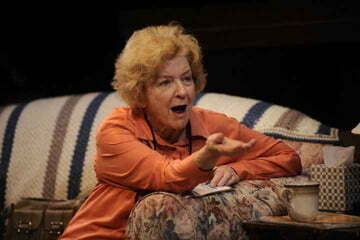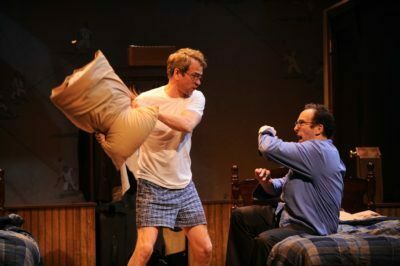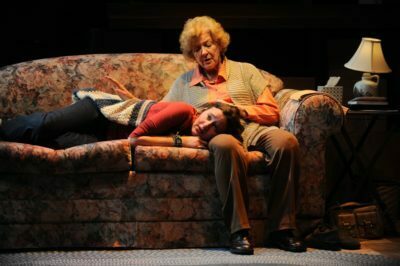The Boy’s Room
Directed by Sandy Shinner
Produced by Victory Gardens Theater
At the Victory Gardens Biograph Theater
Prescient Room needs tidying
There is a cardinal rule when one graduates from college: whatever you do, don’t move back in with your parents. It is a mark of failure, of stigma, of death. And yet, in these economic circumstances, more and more people do just that – including more than one of my friends. But as dire as that pillar is right after you’ve graduated, it only becomes more ossified as time goes on; and the prospect of being forced back beneath your parents’ roof at the age of 30, 40, or 50 is exponentially worse – more embarrassing, even more reeking of failure and stigma.
And Joel Drake Johnson’s new play, The Boys Room, is about exactly that. Tim (Steve Key) has just been divorced by a wife who no longer loves him, lost his job, and is allowed only very limited access to his children; so he has moved back in with his mother, Susan (Mary Ann Thebus). As the play opens, we see Tim’s brother, Ron (Joe Dempsey), scratching at the door; his wife has been diagnosed with breast cancer, and so, buckling under the pressure, he’s left her…and wants back in at Mom’s.
This American drama, like almost any modern American drama, is about a dysfunctional family. The two brothers hate each other. Neither one of them is particularly well-liked by the mother – and, really, who could blame her? One is a dentist who just walked out on his oncogenic wife and 16-year old daughter, Roann (Allison Torem); and the other is a middle-aged, unemployed divorcee. Not exactly a mother’s dream come true.
The Boys Room comes out of the gate looking like a 90s sitcom: playful, slightly mean-spirited banter between mother and first son, Ron; fighting between the suddenly puerile siblings about whose bed is whose, whose life is worse, and who has more right to the room they once shared. It plays with how young we become in certain circumstances – when we’re with our friends from elementary school, or back in our parents’ house, sleeping with our brother in the same room we once did before we went out into the world. But, frankly, much of the humor seems facile. It’s asking too much to be well-liked; it wants too much to be funny, and in a certain way (I found myself laughing at some of the blacker humor when the rest of the audience was silent, and silent as everyone else was roaring at the “funny” bits). There are only two times the boys’ puerile shows become affecting: once, when Ron offers to read out loud to Tim when he’s upset about his family falling apart; and the second time after Ron explodes at his daughter, Roann, and ends up curled into a fetal position, head on his knees, arms wrapped around them, bawling, answering his own daughter’s questions just as a five-year-old would.
The play picks up steam. Mary Ann Thebus’ closing monologue is monumental – easily the best part of the show, especially because of her delivery. It gives us some hint to why the boys are the way they are: she never, it seems, really loved them, at least after their father died when Ron was 9. But we don’t get a strong enough sense of this, even at the end, and it’s only portended a couple of times, when the brothers ask her to tell them she loves them and she obfuscates. It isn’t the strongest foreshadowing. And that, I think, is the greatest weakness of The Boys Room. We don’t get enough of a sense of why these two people are the way they are. Tim is the more sympathetic, as he’s a victim, but how he’s “running after the American dream,” as the program puts it, isn’t at all clear; and for Ron, we need, we yearn for some justification as to why he’s so unappealing. Or we don’t. If a character is dis-likable for a reason, if the play justifies why he is the way he is, it is one thing; if a play doesn’t, and doesn’t quite deliberately, it is another; but if a play sort of explains it, tries to justify it, but comes up short…then there is a problem. And this is, I think, the case with Ron.
Allison Torem also gains strength as the play unfolds. She starts a little awkward – but that’s not entirely her fault. She’s fed awkward lines; and a build between her and Susan that culminates in Roann losing control and screaming is simply unconvincing. Partly because of the script, and partly, perhaps, because of the direction; I lay only small blame on her. It would be very difficult to pull off such an over-the-top scene. But by the time Roann confronts her father and asks if he’s ever coming home, Torem is in fine form.
Key is excellent as Tim, and Thebus is a powerhouse; the only performance that falls a little flat is that of Dempsey, and, again, I find it hard to lay the blame fully on him. He was just a bit lackluster; but, then, so is the character he was presented. Ron seems the least fleshed-out of those on stage. Which is problematic, as he has the greatest stage-time.
For fear of sounding too harsh, I will say, I enjoyed The Boys Room. It is a good play that, with a bit of fine-tuning, could be great. And it does have the Zeitgeist going for it – it is a very timely play; and, so long as there is unemployment and cancer, it will be relevant. Also, the revelation that, while Tim and his wife were having regular, great sex, before their divorce, Ron and his wife haven’t been intimate in three years, adds to the mystery of what makes marriage work. It also is the first time we see the facade of Ron’s wife’s perfection crack – it humanizes a character in dire need of it; there could be a bit more of that.
There are all these moments – like when Roann recounts to Susan what her mother told her: that when she was first introduced to her mother-in-law, Susan simply left the room, and has never touched her eldest son’s wife; and others I have mentioned before – that are the makings of a remarkable play. It’s just not quite there yet. But it could get there, and not with much difficulty.
Somewhat Recommended.
Will Fink
At Victory Gardens, 2433 North Lincoln Ave., Chicago, IL; call (773) 871-3000 or visit www.victorygardens.org; tickets $20-$50; performances Tuesday-Saturday, 7:30, Saturday 4:00, Sunday 3:00, and Wednesday 2:00; running time 90 minutes without intermission; through February 20.

